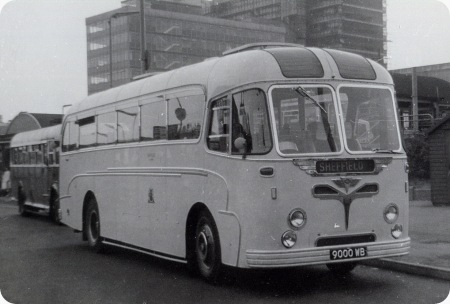Sheffield Corporation – AEC Reliance – 9000 WB – 900
Sheffield Corporation
1958
AEC Reliance MU3RV
Roe Dalesman C37C
This was a one off purchase by Sheffield initially used for visits, inspections etc by the Transport Committee but later used in normal service. My mother travelled on it on a number of occasions on service 48 to Manchester via Woodhead when visiting relations ‘over there’. Having a centre entrance made it unsuitable for one man operation but it still lasted until 1970. Since much of the Peak District single deck work had by this time been converted to OMO, I wonder what use was made of it in the final two or three years.
The bus was renumbered 90 in the 1967 scheme and I recall it being in a pretty dreadful external condition towards the end of its life.
This was Sheffield’s only AEC Reliance (perhaps experience suggested the Leyland 0.600 engine in the early Leopards was a better bet than the head gasket failure prone AEC AH470) and their only coach body built by Roe. I think it is quite an elegant design from what was generally a bus body builder. I assume it would be teak framed like their standard double deck design . Note the non standard size Sheffield Transport fleet name transfer above the City coat of arms.
Photograph and Copy contributed by Ian Wild
A full list of Reliance codes can be seen here.
———
19/06/12 – 18:07
Oh the blessed 900/90. What Ian says from both a professional and enthusiast perspective is quite right, but the Leopards came later. The story I heard was about Civic Spite – between Sheffield and Leeds. Leeds bought one and Sheffield had to have one as well. [Bit like Salford and Manchester.] I assume the 1955 Moncoaches were AH470 rather than AH410, but I agree dry-liner 0.600s were probably a better bet than wet-liner AH470s for charging across the Pennines and into the Peak District. As Charles H Roe’s biggest fan, I’m a little sorry that the Dalesman didn’t quite take off into great popularity – but that wasn’t really the point. Just as Plaxton’s built buses in the summer to cover their dead period, Roe built batches of Dalesmans for sale from stock when they had fallow periods of bus construction. [On that basis, I suppose it’s surprising they built so many Dalesmans!] The construction was of Roe’s original and best.
David Oldfield
———
20/06/12 – 08:17
David. you’re probably aware of this already, but Economic of Whitburn had one of these splendid vehicles on an AEC chassis ‘YPT 796’ and I’m pleased to say that its still alive and well and now forms part of the N.E.B.P.T. Ltd collection
Ronnie Hoye
———
20/06/12 – 08:18
Leeds first coach came in 1965 and was an AEC Reliance with a different style of Roe bodywork. It was always used as a private hire vehicle and never as a committee toy! Indeed the only saloons in the Leeds fleet at that time were some centre entrance standee types on Leyland AEC and Guy chassis seating 34 and some newer Reliances with dual door bodywork. All carried Roe bodies and had mountainous steps. They were certainly not coaches!
Locally West Riding had a batch of AEC Reliance coaches with Dalesman bodywork
Chris Hough
———
20/06/12 – 11:38
These stories which go the rounds….. I actually drove the Leeds coach when in the ownership of David Crowther’s Classic Coaches of High Wycombe. [In lousy weather from Reading to Lord’s Cricket ground – and back.] The Dalesman was dropped after the slightly odd final version in 1959, of which Black & White had, I believe, six. After that, the Roe coach was far closer to a DP on the standard bus shell. Leeds and York Pullman showed how to "coachify" the body to make it more than acceptable for Private Hires – as did Booth and Fisher.
Ronnie, I was aware of the Economic coach, but not its continued existence. Thanks for the good news. Regrettably this Sheffield exile in Surrey may never get to see it in your beautiful part of the world.
David Oldfield
———
20/06/12 – 11:39
There are shots of both the Economic and also a West Riding example at www.sct61.org.uk
Chris Hough
———
21/06/12 – 06:43
There are some interesting comments above and on other pages of this site regarding civic jealousy, rather than civic pride, when it came to having a coach in the fleet. In Southampton, there was a period when the then Transport Manager wanted at least dual purpose vehicles if not full coaches, to support his growing private hire business. The idea was rejected by the Committee, largely because one of the members was of the family owning a local coach operator. Shouldn’t there have been a declaration of interest?
I imagine from the photo that this coach was in overall cream livery. I feel it would have looked better with the lower panels – where the crest is – in blue.
Pete Davies
———
21/06/12 – 06:44
The story goes that on one of its first outings with the Transport Committee on board, 9000 WB ground to a halt in the centre of the city, needing rescue. Apparently before leaving Townhead Street garage, the driver had topped it up with water, but had poured it into the the fuel tank instead of the radiator. Can’t begin to imagine what the Committee chairman had to say about that!
Dave Careless
———
21/06/12 – 06:44
It was known amongst Sheffield Transport staff as the "blunderbus"!
P White
———
21/06/12 – 06:45
Felix of Hadfield also had a "coachified" AEC Reliance- Roe DP vehicle which is happily still around it lives at Sandtoft Trolleybus Museum
Chris Hough
———
21/06/12 – 06:46
David O, I don’t understand your passing reference to Salford and Manchester. Salford had a committee coach – a self-indulgent 26-seat Weymann Fanfare-bodied Reliance that rarely turned a wheel – but I don’t believe Manchester did.
Peter Williamson
———
21/06/12 – 11:22
Peter. Sometimes the brain is faster than the finger. Manchester always had some sort of coach for Ringway services, Salford had to have one and, like Sheffield, the only true use was for the Committee. Yes, the Fanfare got more use in SELNEC days on airport work. [I believe its predecessor was a full fronted Daimler CVD6/Burlingham.
David Oldfield
———
21/06/12 – 11:25
Did Roe have any liaison with Duple over the Dalesman as it bears more than a passing resemblance to the Duple Elizabethan body. Similarly the last version of the Dalesman has a look of the contemporary Willowbrook Viscount One of these ex Felix of Hadfield is also preserved at Sandtoft.
Chris Hough
———
21/06/12 – 19:06
Just for the record, Sheffield used its other coaches (23 I believe) on the longer routes, for example the Peak District routes / railway routes.
Les Dickinson
———
21/06/12 – 19:12
It is said that imitation is the sincerest form of flattery. I think that Roe were probably just inspired by the Elizabethan and copied the general outline of the front entrance version, with its slightly more upright front, yet making it sufficiently different in detail so as not to cause any bother. The Dalesman’s window line was a fraction higher and slightly straighter, and the forward sloping pillar that divided these from the front section was slightly squarer. I rather prefer the Dalesman myself, but Duple soon replaced the Elizabethan with the neater Brittania with its uninterrupted window line, whereas Roe continued with the stepped outline.
John Stringer
———
07/08/12 – 07:19
I suspect this was as much to do with civic pride as anything else. If Leeds has got one, we must too and vice versa. LCT certainly had a Reliance coach, C reg I think. Then there was SCTs 500 City Clipper service, cos Leeds had one, using Merc minibuses. It continues today with the nonsense over trams.
Roger Davies
Quick links to the - Comments Page - Contact Page - Home Page
Comments - Please note: The comments facility is not currently available. Please see the home page for updates.
Please Note if you want to send a photograph with your comment please use the Contact Page by clicking here or send as an attachment via email.

